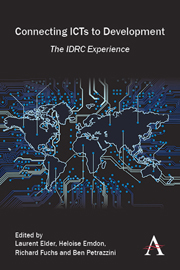Epilogue Into the Future: New Opportunities and Threats in a Global Networked Society
Published online by Cambridge University Press: 05 March 2014
Summary
As we've seen in the previous chapter and the book as a whole, information and communications technologies (ICTs) continue to transform developing countries by increasing people's access to services as well as stimulating economic growth. For example, Chapter 5 illustrated how mobile phones have greatly expanded opportunities for those living at the “bottom of the pyramid” (BOP) in developing countries. The chapter also shows that the positive social impacts of ICTs seem particularly strong in poverty-stricken contexts. Furthermore, the societal transformations linked to the accelerating pace of technological change suggest that the changes we will see in emerging network societies in the global south over the next 10 years will have even greater impacts than those of the previous decade.
ICTs have transformed the landscape of developing countries and opened up new opportunities for advancing human development. The increasing presence of these technologies is shifting developing countries toward a more highly networked society, where social structures and activities evolve around networks through ICTs. Almost 6 billion people use mobile phones. This includes much of the world's poorest, including nearly ninety percent of the poorest populations of Brazil, India, China and South Africa. Nearly two billion people access the Internet, most of them living in developing or emerging economies. Popular and continually evolving applications, often in the form of social media, are driving demand. This historic increase in access to the Internet and mobile phones opens up a series of unique and potentially transformative development opportunities.
- Type
- Chapter
- Information
- Connecting ICTs to DevelopmentThe IDRC Experience, pp. 279 - 286Publisher: Anthem PressPrint publication year: 2013



